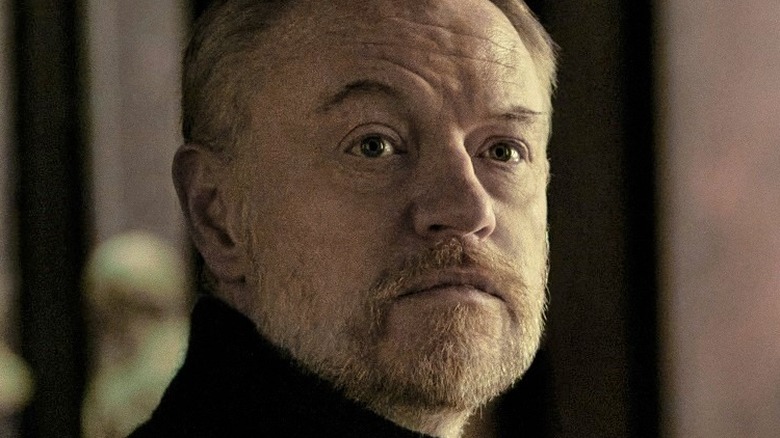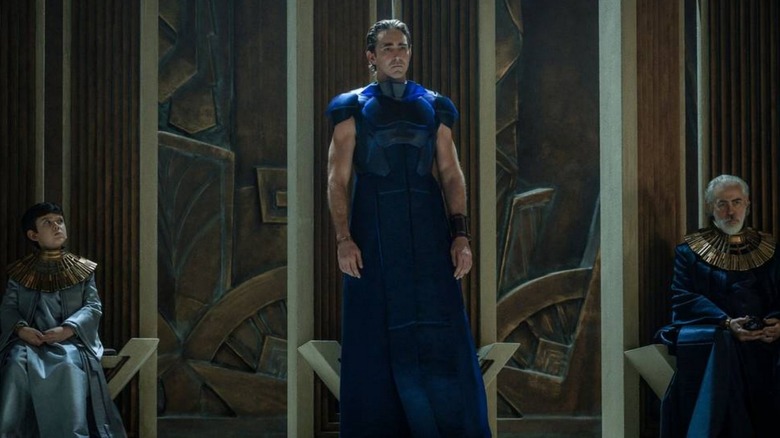How Roland Emmerich's Foundation Would Have Been Different From The TV Show - Exclusive
One of the most talked-about new genre series to debut in 2021 was the Apple TV+ adaptation of "Foundation," based on the series of novels and stories by legendary sci-fi author Isaac Asimov. A chronicle of the fall and rise of a vast galactic empire, with a lone historian and his devoted followers attempting a plan through which they intend to shorten civilization's dark ages from 30,000 years to just 1,000, the show was enough of a success for Apple to greenlight a second season. It also proved divisive among fans of Asimov's work, who felt it took too many liberties with the characters and story.
Nevertheless, the fact that such a cerebral, concept-driven narrative — with the books heavily reliant on ideas and exposition and less on action and characters — could even make it to the screen was something of a miracle. As far back as 1998, the "Foundation" saga had been in development as a film, with 20th Century Fox and New Line Cinema first attempting to wrangle the material. It was in 2009 that Sony Pictures won the rights to the property and recruited Roland Emmerich to direct.
The filmmaker behind visual effects-saturated disaster epics like "Independence Day" and the recent "Moonfall," Emmerich was seen by many at the time as the wrong person for the job. Indeed, after several years of development, he dropped out of the project, which evolved over time into the TV version that arrived on Apple's streaming platform. So how does Emmerich think his version would have differed from what we ultimately saw? "That's a totally different story," he tells Looper in an exclusive interview. "I had a whole different story written."
Roland Emmerich's Foundation started in a different place
The TV version of "Foundation," created by David S. Goyer ("Man of Steel"), does diverge in many significant ways from Asimov's text, but also essentially starts at the beginning: psychohistorian Hari Seldon (Jared Harris), determining that the Galactic Empire will collapse and send human civilization into a period of barbarism lasting for 30 millennia, develops a method of predicting large-scale patterns in human behavior that will allow humanity to emerge from this dark period after just a single millennium.
"That's a totally different story," says Roland Emmerich when asked to compare the Apple series with his vision. "You can make a movie or a trilogy out of 'Foundation.' You can make it as a TV series, and actually they went to the very start of the story. I actually jumped right in the middle when a certain character appears as a bad guy."
The "bad guy" Emmerich is likely referring to is the Mule, an enigmatic human mutant whose existence is not anticipated by the Seldon Plan. He uses his ability to control the emotions of others to harness his own army and challenge the strength of the Foundation. The Mule emerges in the second book, "Foundation and Empire," and Goyer told Den of Geek that the character will eventually show up on the series as well.
Meanwhile, Emmerich emphasizes again that he "had just a whole different story written," adding that his story was penned by "Saving Private Ryan" screenwriter Robert Rodat, "who's writing for me right now a TV show which is about sports in ancient Rome." While it's certainly possible that Emmerich's ancient Rome opus will get to the screen soon, his "Foundation" — for better or worse — will only ever exist in his mind.
"Moonfall" is in theaters now, while "Foundation" can be streamed on Apple TV+.

